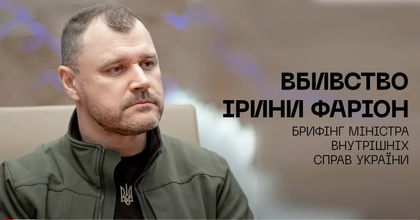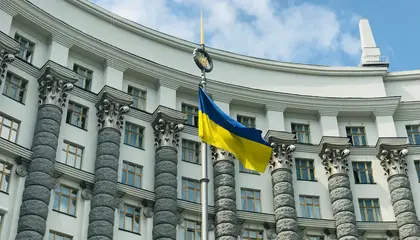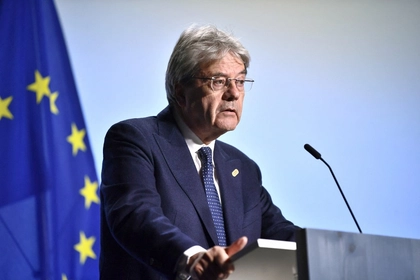Turbulence, volatility and scandals used to be characteristic features of Ukrainian public life. Politicians and oligarchs alike scrambled for power and resources in a real struggle to choose the path of the country’s development. The result was a constantly unfolding daily spectacle (literally and figuratively) for millions of Ukrainians.
Then, on Feb. 24, 2022, all of this shifted to the background. Ukraine had to focus on the fight for its very existence. There was no time or space to spare for internal power struggles, political squabbles and scandals.
JOIN US ON TELEGRAM
Follow our coverage of the war on the @Kyivpost_official.
Of course, domestic politics did not disappear completely, it was reduced to certain necessary functions (legislative practice, local government, personnel policy). But it almost lost its potential for publicity and conflict. Coverage of domestic policy issues in the information space was reduced to a minimum.
As soon as the military situation in Ukraine became relatively stable and direct threats to the country’s existence dissipated, domestic politics began to resurface, little by little – either through high-profile personnel changes or certain controversies and scandals. This started in the summer 2022, but only sporadically. Still, traditional Ukrainian politics (with all its previous conflicts and scandals) seemed inappropriate in the context of the tragic and fateful war for Ukraine.

Farion’s Killer Prepared Disguises, Had Another Victim in His Sights, Interior Minister Says
In September 2023, it became apparent that domestic politics was reemerging in Ukraine. Every week, or even several times a week, high-profile domestic political news appeared in the media. In September, the criminal cases against Kolomoisky and the once-powerful oligarch’s imprisonment in the SBU pre-trial detention center became a political hit. Nestor Shufrych, a veteran of Ukrainian politics as well as close friend and ally of Viktor Medvedchuk, was also imprisoned in the same jail. A new Defense Minister was appointed in Ukraine.
The discussion about the possibility of elections in Ukraine during the war has intensified. What is interesting and noteworthy is that topics for domestic political discussions and potential actions have been arriving from abroad. Apart from elections during the war, the topic of internal reforms, which are a condition for Ukraine’s international partners to continue support, are also being discussed abroad.
Perhaps for the first time in almost 600 days of full-scale war, domestic political news has begun to consistently dominate Ukraine’s information space, as opposed to reports from the frontline and coverage of the international agenda.
Of course, domestic politics in its previous form is not returning completely. It now reflects the context of the war and the agenda related to countering Russia’s invasion. We do not yet know to what extent it is here to stay, but the trend is evident.
Why this resurgence?
The first reason is the relative stabilization of the military situation and the realization that the war will likely drag on indefinitely. Accordingly, some conventional forms of social life, including domestic politics, are returning (at least partially).
The second reason is more substantial and ambiguous: as the war drags on and the relative stabilization of the situation continues, public and media attention is increasingly focused on domestic issues, from corruption to the traditionally domestic political topic of elections. The first to react are the public (social networks, media and civic activists), then representatives of the opposition, and finally the government.
Moreover, in the absence of new significant victories in the war with Russia, a part of society is demanding to find those responsible for the problems at the front and in the rear. The two most convenient targets for this public demand are, firstly, corrupt officials and “oligarchs”; and secondly, the “fifth column,” representatives of pro-Russian forces.
In fact, this is why the criminal cases against Kolomoisky and Shufrych were reopened in September. They would have happened anyway, sooner or later, but now there is a political and media need for it. As for the topic of the upcoming elections, it is in itself a powerful and long-lasting catalyst for the agitation of both the opposition and the government, albeit situational.
Finally, the external factor of domestic policy intensification should be taken into account. It is manifested not only in the elections, but also in the further progress of anti-corruption efforts in Ukraine and in the reform agenda. This is a traditional concern of Ukraine’s Western partners regarding the state of democracy in the country, and Ukraine is confidently and consistently moving forward with reforms.
Some sources claim that Washington and Brussels are concerned about the current system of power in Ukraine being too centralized (which is actually quite natural in a time of war) and overly concentrated in the Office of the President; that it is therefore necessary to restore (or create) certain political and administrative levers of containment and counterbalance in Ukraine. Hence, all the attention being paid to the creation of supervisory and public councils at various state institutions in the “List of Reforms” recently put forward by the US and other international partners.
How will the return of domestic politics during wartime affect Ukraine?
First, this process is likely to continue. The main struggle will unfold in the near future around the continued existence of the United News TV telethon, which unified the major TV stations shortly after the full-scale invasion. Inside Ukraine, there have long been voices calling for its termination. It is likely that Ukraine’s international partners will continue to lobby for this issue.
Second, the forms and extent of any further return of domestic politics to Ukraine depend on the following factors: 1) the situation on the frontline; 2) the level of severity of internal problems (socio-economic situation; problems with corruption; scandals and conflicts within or around the government); 3) actions of the government and the opposition; 4) actions of Ukraine’s partners (or the situation in their countries).
Future scenarios of domestic political development during the war
The most dangerous scenario is an uncontrolled and highly conflictual domestic political situation. It may become possible if most negative factors come together at once – setbacks at the front, aggravation of internal problems, reckless and conflictual actions of the opposition, critical mistakes of the authorities. The result could be a political crisis in the country, which the enemy could take advantage of. So far, this scenario seems unlikely, but its risks should be kept in mind and neutralized in a timely manner.
The exact opposite scenario includes victories on the frontline and a stable domestic situation. In this case, domestic policy will be of a background and secondary nature. However, although we sometimes do encounter perfect situations, they are only temporary and in limited forms.
The third (most likely) scenario is the parallel existence of war and relatively active domestic policy. This was the situation we had from 2014 to early 2022, but then the scale and risks of war were much smaller.
The return of domestic politics in a time of war will be a challenge for both the government and the opposition. In order to neutralize potential risks, the government would need to become more open in its interaction with the public, the opposition and even the parliament, with more a flexible and balanced policy. In turn, the opposition and active civil society would have to be responsible and remember that confrontation with the government is not an end in itself, the war with Russia is far from over, and internal unity in the fight against an external enemy must be maintained at all costs.
You can also highlight the text and press Ctrl + Enter






